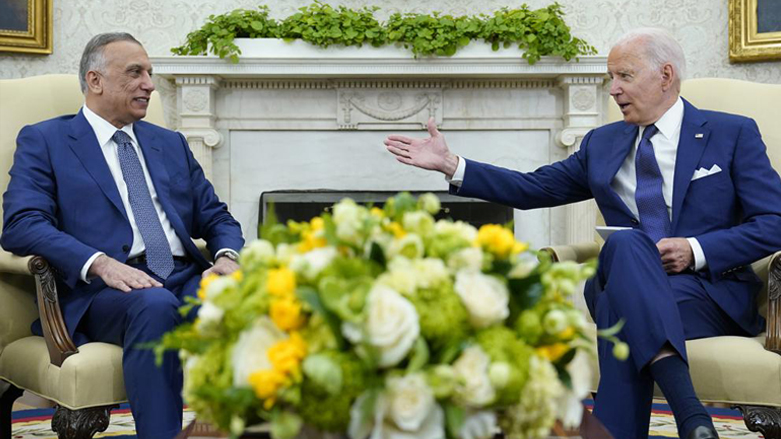Biden expresses support for Kadhimi in phone call
The clashes ended late on Tuesday, after Sadr called on his followers to cease their protests and return home.

WASHINGTON DC, United States (Kurdistan 24) – US President Joe Biden offered his support to Iraqi Prime Minister, Mustafa al-Kadhimi, in a telephone call between the two leaders on Wednesday.
Their phone call followed two days of violent clashes related to the political crisis that has enveloped Iraq ten months after last October’s elections and the failure of Iraqi politicians to form a government in that time.
The clashes on Monday and Tuesday left some 30 people dead. That includes followers of Muqtada al-Sadr, the largest vote-winner in the elections, who has been thwarted in his effort to form a government by an Iranian-directed judicial coup, as well as members of Iraq’s security forces.
The clashes ended late on Tuesday, after Sadr called on his followers to cease their protests and return home.
Biden then spoke the following day with Kadhimi “to discuss US support for a sovereign and independent Iraq,” a White House readout of their discussion explained.
Biden commended “Kadhimi’s personal leadership” during the “escalating tensions and violence.” The US President also “praised the performance of the Iraqi Security Forces,” while he “extended condolences to the families of those killed in the recent fighting.”
Biden and Kadhimi “called on all Iraqi leaders to engage in a national dialogue to forge a common way forward consistent with Iraq’s constitution and laws” the US read-out said.
Yet the biggest obstacle to forging “a common way forward”—that is to forming a new government—is Iraq’s Supreme Federal Court and how it is now interpreting Iraqi laws.
In early 2022, the Court changed the rules for government formation. It raised the threshold required for parliamentary approval of a new government from a simply majority to a two-thirds majority.
That was done at Tehran’s direction, in what Michael Knights, of The Washington Institute for Near East Policy, has described as “a foreign-backed judicial coup.”
Thus, although Sadr did gain a parliamentary majority—in combination with the Kurdistan Democratic Party, the biggest Kurdish party, as well as Taqaddum, the Sunni Arab party led by Mohammed al-Halbousi, Speaker of the Iraqi parliament—Sadr has been blocked from forming a government by Iran and its allies in Baghdad.
This maneuver, as Knights explained, is fully known to the Biden administration, but it has been unwilling to explain publicly the suborning of Iraq’s judiciary and the role that Iran played.
Skirting that issue, Biden “offered his full support” in his discussion with Kadhimi, for the Iraqi leader’s “efforts to de-escalate tensions in the region through dialogue and diplomacy,” while the two “agreed to remain in touch over the coming weeks.”
Change in US Policy?
Until very recently, the Biden administration remained aloof from Iraq’s internal political strife, prompting critics to complain that it needed to be more involved.
Indeed, one of those critics, David Schenker, recently wrote just such a critique in “Foreign Policy.” Schenker cited a briefing given by a senior administration official last December which explained that the administration’s plan on Iraq’s government formation was to “leave it to the Iraqis to sort out.’”
But that just left the field open to Iran and its allies in Baghdad, as several Congressman have complained.
Indeed, journalists asked the State Department Deputy Spokesperson, who briefed on Monday, if there had been, amid the unrest, any high level calls between US and Iraqi officials. The answer was no.
They asked again on Tuesday and received the same answer. However, the first hint that US policy might be shifting, came from Baghdad that day, when the US ambassador, Alina Romanowski, tweeted her welcome of Sadr’s call to his followers to cease their protests and return home.
Romanowski did not mention Sadr by name, but her meaning was clear, and her positive statement about Sadr’s action was more than any other US official had been willing to offer.
Read More: US welcomes call on Iraqi protestors to withdraw—but does not mention Sadr’s name!
So, on Wednesday, as Biden spoke with Kadhimi, their conversation may well represent another indication that the US position is shifting, particularly as their discussion included an agreement “to remain in touch of the coming weeks.”
If so, the Kurdistan Region will also benefit from the shift in US policy.